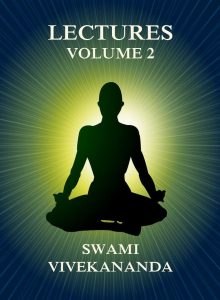Lectures Vol. 2 – Swami Vivekananda
Swami Vivekananda was an Indian Hindu monk and chief disciple of the 19th-century saint Ramakrishna. He was a key figure in the introduction of the Indian philosophies of Vedanta and Yoga to the Western world and is credited with raising interfaith awareness, bringing Hinduism to the status of a major world religion during the late 19th century. This book includes the following of his brilliant lectures:
Work And Its Secret
The Powers Of The Mind
Hints On Practical Spirituality
Bhakti Or Devotion
The Way To The Realisation Of A Universal Religion
The Ideal Of A Universal Religion
The Open Secret
… and many more …
Format: Paperback.
Lectures Vol. 2.
ISBN: 9783849695712
Available at amazon.com and other venues.
Swami Vivekananda’s teachings and philosophy (from Wikipedia):
Vivekananda propagated that the essence of Hinduism was best expressed in Adi Shankara’s Advaita Vedanta philosophy. Nevertheless, following Ramakrishna, and in contrast to Advaita Vedanta, Vivekananda believed that the Absolute is both immanent and transcendent. According to Anil Sooklal, Vivekananda’s neo-Advaita “reconciles Dvaita or dualism and Advaita or non-dualism”. Vivekananda summarised the Vedanta as follows, giving it a modern and Universalistic interpretation:
Each soul is potentially divine. The goal is to manifest this Divinity within by controlling nature, external and internal. Do this either by work, or worship, or mental discipline, or philosophy—by one, or more, or all of these—and be free. This is the whole of religion. Doctrines, or dogmas, or rituals, or books, or temples, or forms, are but secondary details.
Nationalism was a prominent theme in Vivekananda’s thought. He believed that a country’s future depends on its people, and his teachings focused on human development. He wanted “to set in motion a machinery which will bring noblest ideas to the doorstep of even the poorest and the meanest”.
Vivekananda linked morality with control of the mind, seeing truth, purity and unselfishness as traits which strengthened it. He advised his followers to be holy, unselfish and to have śraddhā (faith). Vivekananda supported brahmacharya (celibacy), believing it the source of his physical and mental stamina and eloquence. He emphasised that success was an outcome of focused thought and action; in his lectures on Raja Yoga he said, “Take up one idea. Make that one idea your life – think of it, dream of it, live on that idea. Let the brain, muscles, nerves, every part of your body, be full of that idea, and just leave every other idea alone. This is the way to success, that is the way great spiritual giants are produced”.
(The text of the last section was taken from a Wikipedia entry and is available under the the Creative Commons Attribution-ShareAlike License.)
Publisher’s Note: This book is printed and distributed by Createspace a DBA of On-Demand Publishing LLC and is typically not available anywhere else than in stores owned and operated by Amazon or Createspace.

